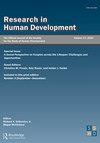TIME ATTITUDE PROFILES IN AMERICAN ADOLESCENTS: EDUCATIONAL AND PSYCHOLOGICAL CORRELATES
IF 1.4
4区 心理学
Q4 PSYCHOLOGY, DEVELOPMENTAL
引用次数: 13
Abstract
Previous research has suggested that time attitude profiles play a greater role in differentiating between adaptive and maladaptive outcomes than individual time attitude scores. In this manuscript, we examined this claim in two samples of American adolescents. The Study 1 sample consisted of 300 participants aged 12 to 19 (M = 16.06, SD = 1.25; 40% female) from diverse ethnic-racial groups. In this sample, we looked at the bivariate correlations between time attitudes and (a) other time constructs (consideration of future consequences, hope, optimism, perceived life chances), (b) academic constructs (academic self-concept, valuing education, perceived barriers to attending college, and school belonging), and (c) expected job discrimination on the basis of gender and ethnicity/race. We also examined the association between these constructs and time attitude profiles. The Study 2 sample consisted of 748 adolescents aged 11 to 20 (M = 15.71, SD = 1.53; 54% female), also from diverse ethnic-racial backgrounds. Similar analyses were conducted in Study 2, but with hopelessness, abstract and concrete attitudes toward education, past discrimination, and expected job discrimination on the basis of gender, ethnicity/race, and income. In both studies, time attitude profiles were strongly associated with outcomes, even when time attitudes were not correlated with the variables. Thus, time attitude profiles seem to be a strong general predictor of adolescent functioning across multiple domains. The findings highlight the importance of time attitude profiles and suggest that these may be useful targets for intervention.美国青少年的时间态度特征:教育和心理相关性
先前的研究表明,在区分适应和不适应结果方面,时间态度特征比个人时间态度得分发挥更大的作用。在本文中,我们在两个美国青少年样本中检验了这一说法。研究1样本包括300名12 - 19岁的参与者(M = 16.06, SD = 1.25;40%是女性)来自不同的种族群体。在这个样本中,我们研究了时间态度与(a)其他时间构念(考虑未来后果、希望、乐观、感知生活机会)、(b)学术构念(学术自我概念、重视教育、感知上大学的障碍和学校归属感)以及(c)基于性别和民族/种族的预期就业歧视之间的双变量相关性。我们还研究了这些构念和时间态度之间的关系。研究2样本包括748名11 ~ 20岁的青少年(M = 15.71, SD = 1.53;54%是女性),也有不同的种族背景。在研究2中进行了类似的分析,但对教育,过去的歧视以及基于性别,民族/种族和收入的预期工作歧视的态度是绝望的,抽象的和具体的。在这两项研究中,即使时间态度与变量无关,时间态度也与结果密切相关。因此,时间态度概况似乎是青少年跨多个领域功能的一个强有力的普遍预测指标。研究结果强调了时间态度特征的重要性,并建议这些可能是干预的有用目标。
本文章由计算机程序翻译,如有差异,请以英文原文为准。
求助全文
约1分钟内获得全文
求助全文

 求助内容:
求助内容: 应助结果提醒方式:
应助结果提醒方式:


